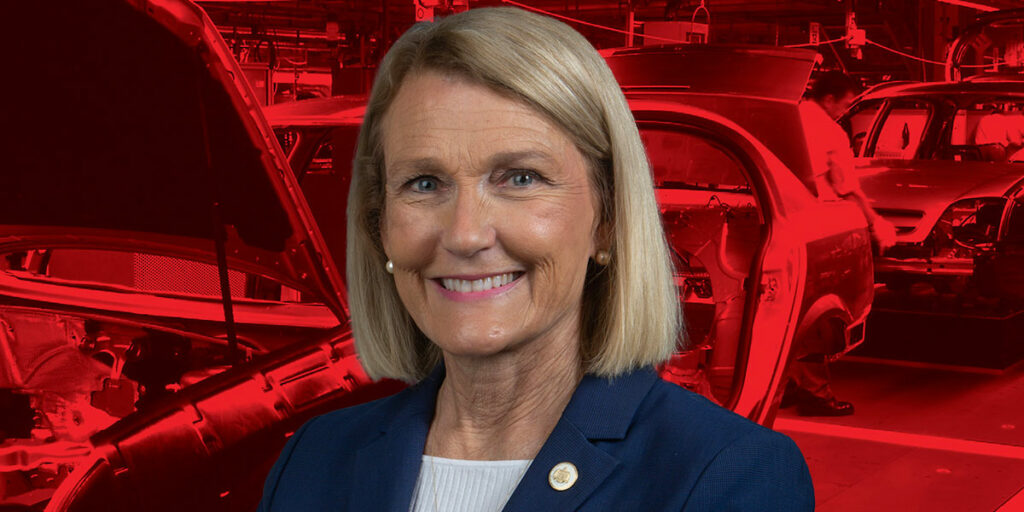Alabama Commerce Secretary Greg Canfield told the state’s economic developers that competition for new and expanding industry is fierce in the Southeast, likening it to chumming the waters for sharks, followed by a feeding frenzy.
That feeding frenzy has led to deals in other states that Canfield said “don’t make sense.”
Rather than getting caught up in that feeding frenzy, Alabama’s strategy will continue to be focused and steady, Canfield said at the Economic Development Association of Alabama (EDAA) 2023 Summer Conference.
“We don’t want to win everything, but we want to win what we want to win.”
Alabama Commerce Secretary Greg Canfield talks about moving forward armed with The Game Plan from Alabama News Center on Vimeo.
Alabama economic developers have some enhanced tools to help them win what they want to win.
The Game Plan package of economic development incentives were a key topic throughout the EDAA conference.
Having state lawmakers approve key incentives that were set to expire, raising the caps on those incentives and creating new initiatives were all key, Canfield said. Just as important, he said, was the teamwork it took to first identify what incentives were needed, getting them through the Legislature and signed by Gov. Kay Ivey.
It’s the kind of collaborative effort Canfield said he hears about often when talking with CEOs, site consultants and other decision makers who’ve chosen Alabama for projects.
“Alabama is strong because you guys work together” is what they say, Canfield asserted.
That teamwork created a record-setting year in economic development for the state last year. Alabama saw capital investment hit an all-time one-year high of $10.1 billion. The state’s $25.5 billion in exports was also a new record.
But Canfield said he prefers looking ahead, noting that that the state has great opportunities but also some challenges. In addition to the aforementioned “feeding frenzy” being created by competing states, there are ongoing workforce challenges that companies face and need help overcoming.
Canfield said the state doesn’t just recruit companies here and leave them to fend for themselves with issues like workforce development.
“If we aren’t presenting ourselves as problem solvers, then we are part of the problem,” he said.
AIDT, the state’s leading workforce development incentive, recently revived its Shift Alabama campaign to target adding 11,000 automotive workers. Canfield said that’s an example of Alabama’s ability to partner with industry to address a need.
“Alabama is a state that companies, once they come here, they view us as a true partner in helping them solve challenges and problems,” he said. “And that’s what sets states like Alabama apart from others. We get into the problem with the company and we seek solutions.”
He said The Game Plan package of incentives approved by lawmakers and signed by the governor put an emphasis on preparing new sites for projects.
“Our neighboring states are putting more money into developing sites,” Canfield said. “We’ve become site-poor because of our own success, so we’ve got to develop more sites ourselves.”
Mississippi has approved $57 million for site development projects. Virginia has funded its Business Ready Sites Program with $90 million. Kentucky has put $100 million into the Kentucky Product Development Initiative. Tennessee pledged $170 million to the development of the megasite chosen for Ford’s Blue Oval City for EV and battery production.
In addition to the competition, Canfield said disruptors are getting his attention.
“Disruptions create opportunities,” Canfield said. “They can scare you a little bit.”
The latest disruptors getting Canfield’s attention are artificial intelligence, alternative energy, cloud computing, robotics and cybersecurity. Those are all areas where companies are looking to make more investments in the future, and that could create opportunities, Canfield said.
Canfield and the Department of Commerce have two statewide allies to help meet the challenges ahead.
The Economic Development Partnership of Alabama (EDPA) is putting an emphasis on workforce development. EDPA President Greg Barker said its ALEX (an acronym from the Alabama Experience) mobile trailer, which offers a one-stop shop for people to explore employment opportunities in Alabama-based industries, is ready to hit the roads and be tailored to specific communities. And EDPA’s Fuel Alabama initiative targets college students to try to retain them in the state after graduation. For those students, the emphasis isn’t on states.
“They’re choosing between communities,” Barker said. “It’s not Alabama vs. Tennessee; it’s Huntsville vs. Nashville.”
Innovate Alabama is another statewide ally, with a focus on growing the tech sector and entrepreneurship.
“Commerce doesn’t create companies. We’re not innovators,” Canfield said of the state agency he leads. “We needed an entity like Innovate Alabama that is made up of innovators and made up of tech companies and made up of business leaders from typically, historically disadvantaged populations to kind of lead us in a new direction. So, this is an evolution and we’re proud to be a part of that.”
(Courtesy of Alabama NewsCenter)













